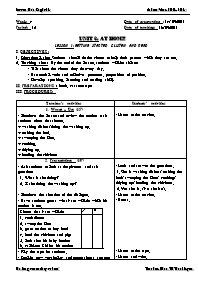Giáo án môn Tiếng Anh Lớp 8 - Unit 3: At home - Lesson 1: Getting started & listen and read

UNIT 3: AT HOME
LESSON 1: GETTING STARTED & LISTEN AND READ
I. OBJECTIVES:
1. Educational aim: Students should do the chores to help their parents while they are out.
2. Teaching aims: By the end of the lesson, students will be able to:
- Talk about the chores they do every day.
- Use modal verbs and reflexive pronouns, preposition of position.
- Develop speaking, listening and reading skill.
II. PREPARATIONS: book, cassette tape
Bạn đang xem tài liệu "Giáo án môn Tiếng Anh Lớp 8 - Unit 3: At home - Lesson 1: Getting started & listen and read", để tải tài liệu gốc về máy bạn click vào nút DOWNLOAD ở trên
Week: 4 Date of preparation: 14/ 09/2011 Period: 12 Date of teaching: 16/ 09/2011 UNIT 3: AT HOME LESSON 1: GETTING STARTED & LISTEN AND READ I. OBJECTIVES: 1. Educational aim: Students should do the chores to help their parents while they are out. 2. Teaching aims: By the end of the lesson, students will be able to: - Talk about the chores they do every day. - Use modal verbs and reflexive pronouns, preposition of position. - Develop speaking, listening and reading skill. II. PREPARATIONS: book, cassette tape III. PROCEDURES: Teacher’s activities Students’ activities 1. Warm – Up: (15’) - Introduce the lesson and review the routine task students often do at home. + washing dishes/ doing the washing up. + making the bed. + sweeping the floor. + cooking. + tidying up. + feeding the chickens 2. Presentation: (10’) - Ask students to look at the pictures and ask questions 1. What is she doing? 2. Is she doing the washing up? - Introduce the situation of the dialogue. - Have students guess what Nam will do while his mother is out. Chores that Nam will do ü û 1. cook dinner 2. sweep the floor 3. go to market to buy food 4. feed the chickens and pigs 5. look after his baby brother 6. call Aunt Chi for his mother - Play the tape for students. - Explain new vocabulary and expressions: steamer, saucepan, frying pan, and rice cooker, Give my love to Grandma, No problem. - Introduce structure: Modal verbs have to/ought to/must + V_ inf Preposition of position: in, on, at, beneath, above, between, opposite, in front of, behind, on the left, on the right.. ¯ Modal verbs and reflexive pronouns I’ll You’ll He’ll She’ll We’ll You’ll They’ll have to ought to must cook dinner make the bed sweep the floor myself. yourself. himself. herself. ourselves. yourselves. themselves. 3. Practice: (10’) - Ask students to practice the dialogue. - Ask students to complete the list of things Nam has to do. - Ask students to read the dialogue again. 4. Production: (13’) - Ask students what chores they often do at home. 1. What do you have to do at home? 2. Do you have to cook meals? 3. Do you have to ? 5. Homework: (2’) - Write the chores you often do at home. - Do the exercises 1,2 / p.20, 21 (workbook) - Prepare next lesson: Unit 3 – Speak /p. 27. - Listen to the teacher. - Look and answer the questions. 1. She is washing dishes/ making the bed/ sweeping the floor/ cooking/ tidying up/ feeding the chickens. 2. Yes she is. / No she isn’t. - Listen to the teacher. - Guess. - Listen to the tape. - Listen and write. - Listen and write. - Pair works. - List the things Nam has to do. 1. Nam has to cook dinner. 2. He has to go to the market and buy fish and vegetables. 3. He has to call his aunt Chi and ask her to meet his mother at Grandma’s house. - Read the dialogue. - Answer the questions. 1. I have to wash the dishes. 2. Yes, I do/ No, I don’t. 3. Yes, I do./ No, I don’t. Take note. IV. COMMENTS: ------------------------------------------------------------------------------------------------------------------------------------------------------------------------------------------------------------------------------------ _________________________________________b"&"a_________________________
Tài liệu đính kèm:
 unit_3_at_home_lesson_1_getting_started_listen_and_read.doc
unit_3_at_home_lesson_1_getting_started_listen_and_read.doc





